University Essay: Reflecting on Early Childhood Education and Care
VerifiedAdded on 2023/06/03
|8
|2207
|127
Essay
AI Summary
This reflective essay delves into the crucial role of early childhood education and care (ECEC) in fostering children's development, emphasizing the importance of supporting families with young children. The essay highlights the responsibilities of an early childhood educator in nurturing children's identity, self-confidence, emotional intelligence, and problem-solving skills. It reflects on the essential aspects of becoming a successful early childhood teacher, including pedagogical skills, communication, cultural competence, and adherence to ethical standards and policies. The essay explores the holistic approach to child development, considering physical, emotional, social, and spiritual well-being. It discusses the importance of respecting children's rights, building positive relationships, creating a supportive learning environment, and making effective decisions through collaboration. Furthermore, it addresses the significance of cultural diversity, particularly the understanding of Aboriginal cultures, and the use of play-based teaching methods and technology to enhance learning. The essay concludes by emphasizing the continuous evaluation of pedagogical practices and the commitment to meeting the standards of an ethical and effective early childhood educator.
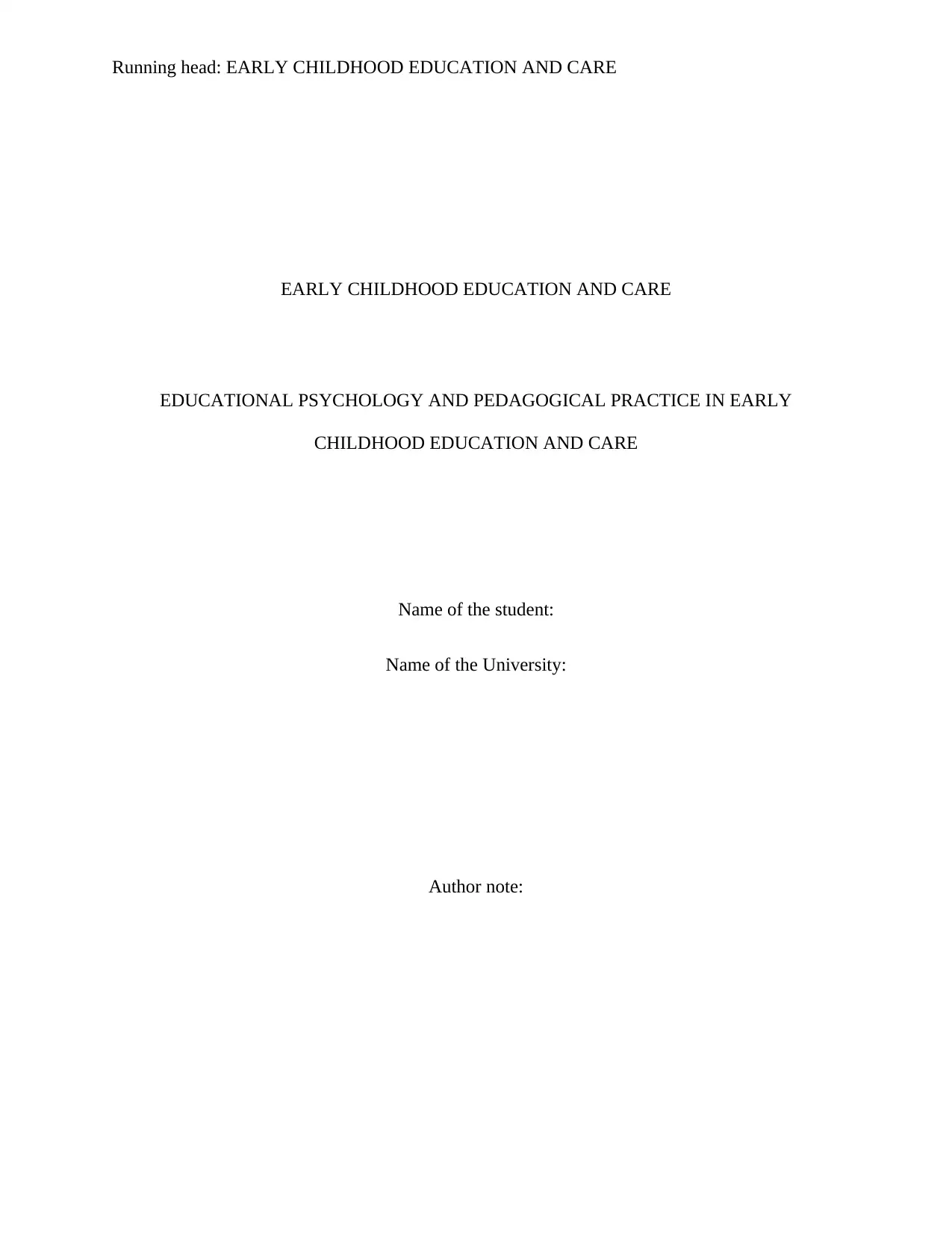
Running head: EARLY CHILDHOOD EDUCATION AND CARE
EARLY CHILDHOOD EDUCATION AND CARE
EDUCATIONAL PSYCHOLOGY AND PEDAGOGICAL PRACTICE IN EARLY
CHILDHOOD EDUCATION AND CARE
Name of the student:
Name of the University:
Author note:
EARLY CHILDHOOD EDUCATION AND CARE
EDUCATIONAL PSYCHOLOGY AND PEDAGOGICAL PRACTICE IN EARLY
CHILDHOOD EDUCATION AND CARE
Name of the student:
Name of the University:
Author note:
Paraphrase This Document
Need a fresh take? Get an instant paraphrase of this document with our AI Paraphraser
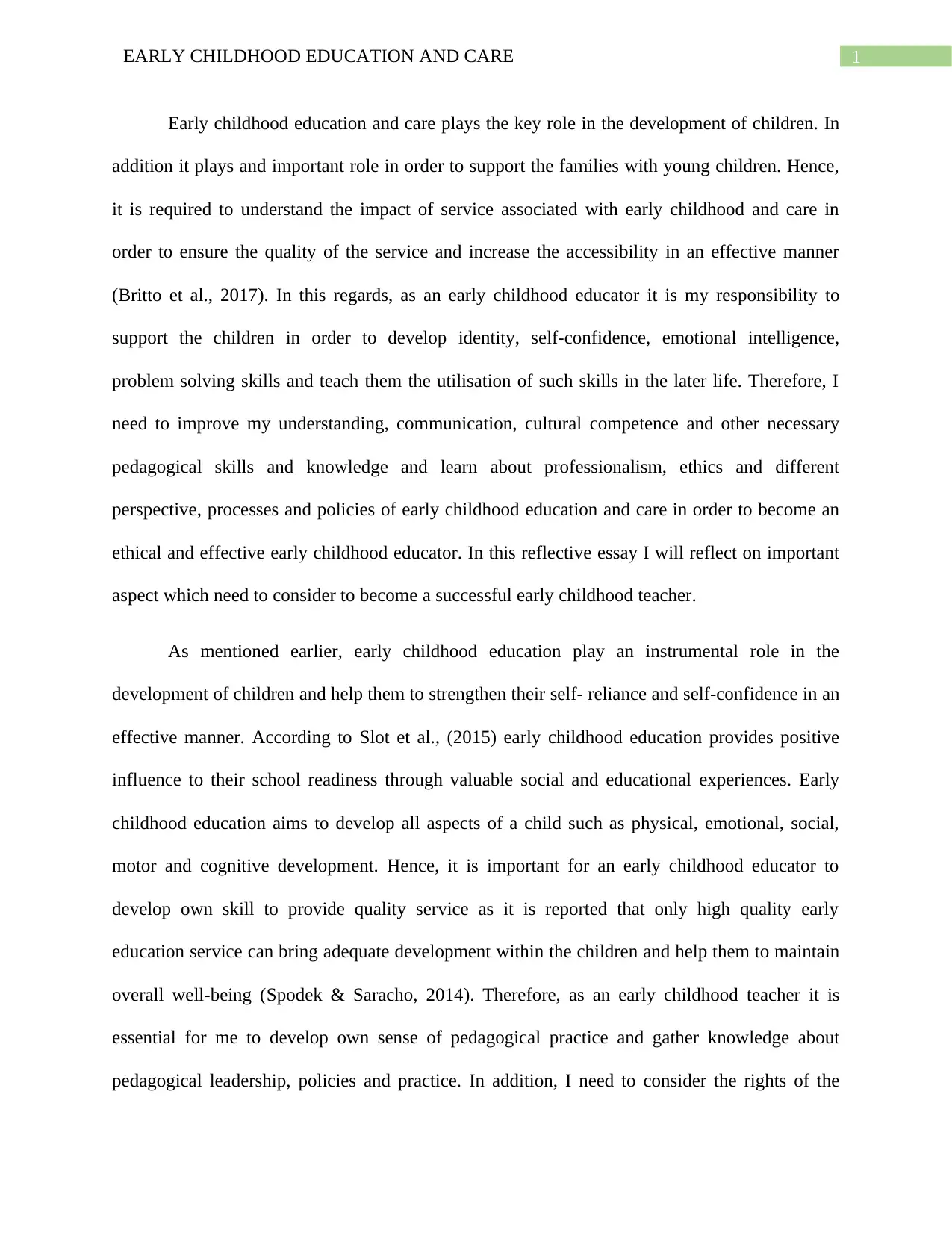
1EARLY CHILDHOOD EDUCATION AND CARE
Early childhood education and care plays the key role in the development of children. In
addition it plays and important role in order to support the families with young children. Hence,
it is required to understand the impact of service associated with early childhood and care in
order to ensure the quality of the service and increase the accessibility in an effective manner
(Britto et al., 2017). In this regards, as an early childhood educator it is my responsibility to
support the children in order to develop identity, self-confidence, emotional intelligence,
problem solving skills and teach them the utilisation of such skills in the later life. Therefore, I
need to improve my understanding, communication, cultural competence and other necessary
pedagogical skills and knowledge and learn about professionalism, ethics and different
perspective, processes and policies of early childhood education and care in order to become an
ethical and effective early childhood educator. In this reflective essay I will reflect on important
aspect which need to consider to become a successful early childhood teacher.
As mentioned earlier, early childhood education play an instrumental role in the
development of children and help them to strengthen their self- reliance and self-confidence in an
effective manner. According to Slot et al., (2015) early childhood education provides positive
influence to their school readiness through valuable social and educational experiences. Early
childhood education aims to develop all aspects of a child such as physical, emotional, social,
motor and cognitive development. Hence, it is important for an early childhood educator to
develop own skill to provide quality service as it is reported that only high quality early
education service can bring adequate development within the children and help them to maintain
overall well-being (Spodek & Saracho, 2014). Therefore, as an early childhood teacher it is
essential for me to develop own sense of pedagogical practice and gather knowledge about
pedagogical leadership, policies and practice. In addition, I need to consider the rights of the
Early childhood education and care plays the key role in the development of children. In
addition it plays and important role in order to support the families with young children. Hence,
it is required to understand the impact of service associated with early childhood and care in
order to ensure the quality of the service and increase the accessibility in an effective manner
(Britto et al., 2017). In this regards, as an early childhood educator it is my responsibility to
support the children in order to develop identity, self-confidence, emotional intelligence,
problem solving skills and teach them the utilisation of such skills in the later life. Therefore, I
need to improve my understanding, communication, cultural competence and other necessary
pedagogical skills and knowledge and learn about professionalism, ethics and different
perspective, processes and policies of early childhood education and care in order to become an
ethical and effective early childhood educator. In this reflective essay I will reflect on important
aspect which need to consider to become a successful early childhood teacher.
As mentioned earlier, early childhood education play an instrumental role in the
development of children and help them to strengthen their self- reliance and self-confidence in an
effective manner. According to Slot et al., (2015) early childhood education provides positive
influence to their school readiness through valuable social and educational experiences. Early
childhood education aims to develop all aspects of a child such as physical, emotional, social,
motor and cognitive development. Hence, it is important for an early childhood educator to
develop own skill to provide quality service as it is reported that only high quality early
education service can bring adequate development within the children and help them to maintain
overall well-being (Spodek & Saracho, 2014). Therefore, as an early childhood teacher it is
essential for me to develop own sense of pedagogical practice and gather knowledge about
pedagogical leadership, policies and practice. In addition, I need to consider the rights of the
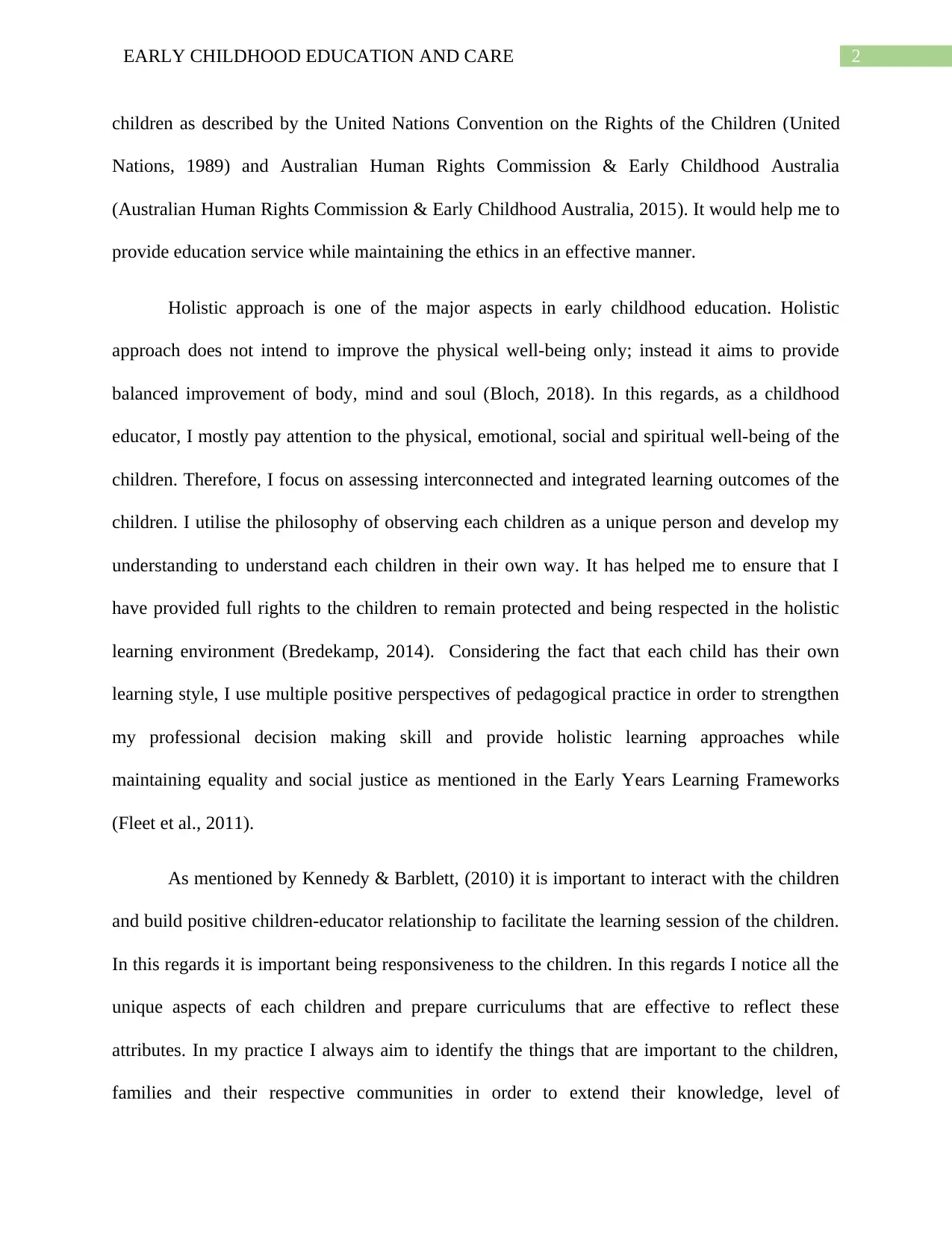
2EARLY CHILDHOOD EDUCATION AND CARE
children as described by the United Nations Convention on the Rights of the Children (United
Nations, 1989) and Australian Human Rights Commission & Early Childhood Australia
(Australian Human Rights Commission & Early Childhood Australia, 2015). It would help me to
provide education service while maintaining the ethics in an effective manner.
Holistic approach is one of the major aspects in early childhood education. Holistic
approach does not intend to improve the physical well-being only; instead it aims to provide
balanced improvement of body, mind and soul (Bloch, 2018). In this regards, as a childhood
educator, I mostly pay attention to the physical, emotional, social and spiritual well-being of the
children. Therefore, I focus on assessing interconnected and integrated learning outcomes of the
children. I utilise the philosophy of observing each children as a unique person and develop my
understanding to understand each children in their own way. It has helped me to ensure that I
have provided full rights to the children to remain protected and being respected in the holistic
learning environment (Bredekamp, 2014). Considering the fact that each child has their own
learning style, I use multiple positive perspectives of pedagogical practice in order to strengthen
my professional decision making skill and provide holistic learning approaches while
maintaining equality and social justice as mentioned in the Early Years Learning Frameworks
(Fleet et al., 2011).
As mentioned by Kennedy & Barblett, (2010) it is important to interact with the children
and build positive children-educator relationship to facilitate the learning session of the children.
In this regards it is important being responsiveness to the children. In this regards I notice all the
unique aspects of each children and prepare curriculums that are effective to reflect these
attributes. In my practice I always aim to identify the things that are important to the children,
families and their respective communities in order to extend their knowledge, level of
children as described by the United Nations Convention on the Rights of the Children (United
Nations, 1989) and Australian Human Rights Commission & Early Childhood Australia
(Australian Human Rights Commission & Early Childhood Australia, 2015). It would help me to
provide education service while maintaining the ethics in an effective manner.
Holistic approach is one of the major aspects in early childhood education. Holistic
approach does not intend to improve the physical well-being only; instead it aims to provide
balanced improvement of body, mind and soul (Bloch, 2018). In this regards, as a childhood
educator, I mostly pay attention to the physical, emotional, social and spiritual well-being of the
children. Therefore, I focus on assessing interconnected and integrated learning outcomes of the
children. I utilise the philosophy of observing each children as a unique person and develop my
understanding to understand each children in their own way. It has helped me to ensure that I
have provided full rights to the children to remain protected and being respected in the holistic
learning environment (Bredekamp, 2014). Considering the fact that each child has their own
learning style, I use multiple positive perspectives of pedagogical practice in order to strengthen
my professional decision making skill and provide holistic learning approaches while
maintaining equality and social justice as mentioned in the Early Years Learning Frameworks
(Fleet et al., 2011).
As mentioned by Kennedy & Barblett, (2010) it is important to interact with the children
and build positive children-educator relationship to facilitate the learning session of the children.
In this regards it is important being responsiveness to the children. In this regards I notice all the
unique aspects of each children and prepare curriculums that are effective to reflect these
attributes. In my practice I always aim to identify the things that are important to the children,
families and their respective communities in order to extend their knowledge, level of
⊘ This is a preview!⊘
Do you want full access?
Subscribe today to unlock all pages.

Trusted by 1+ million students worldwide
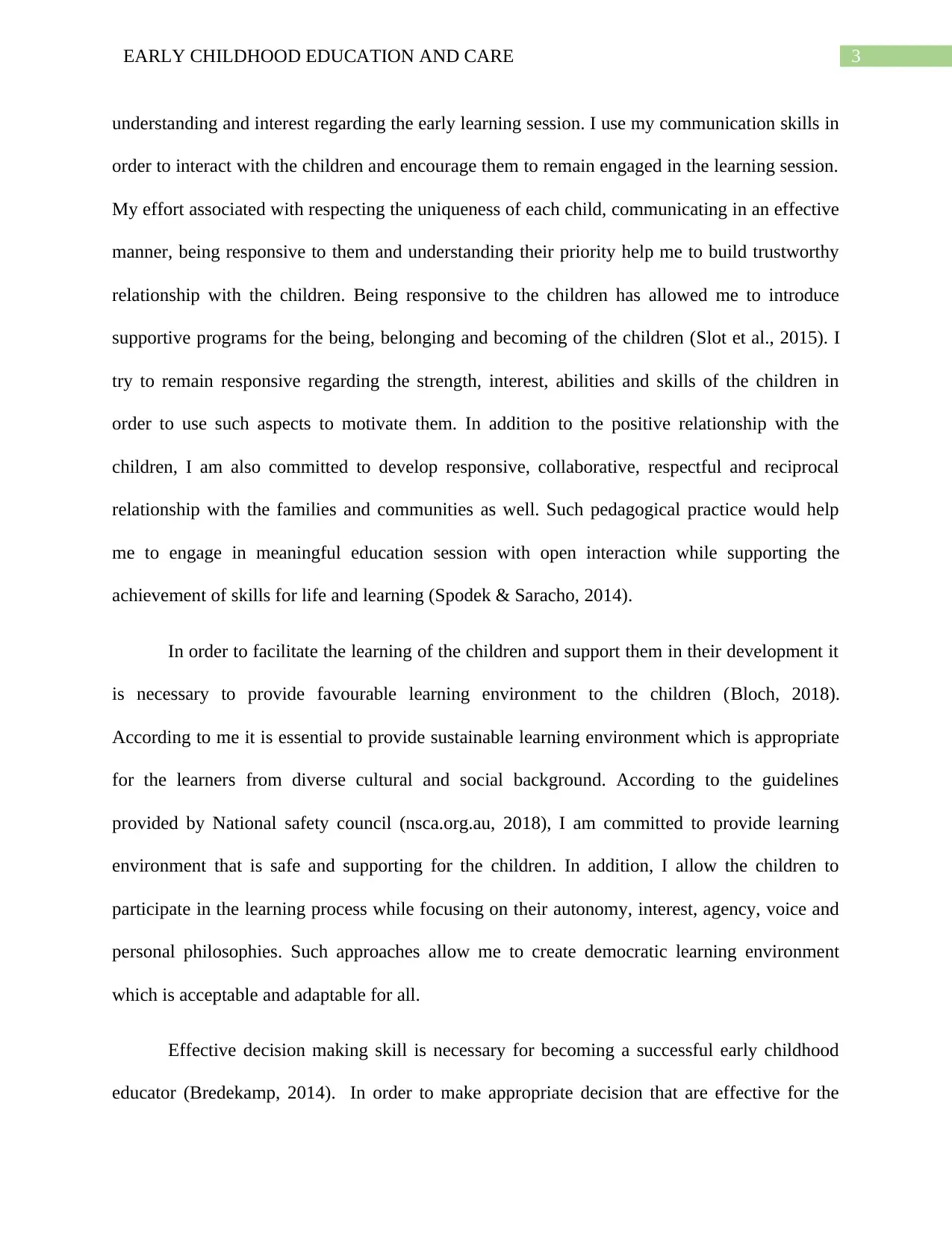
3EARLY CHILDHOOD EDUCATION AND CARE
understanding and interest regarding the early learning session. I use my communication skills in
order to interact with the children and encourage them to remain engaged in the learning session.
My effort associated with respecting the uniqueness of each child, communicating in an effective
manner, being responsive to them and understanding their priority help me to build trustworthy
relationship with the children. Being responsive to the children has allowed me to introduce
supportive programs for the being, belonging and becoming of the children (Slot et al., 2015). I
try to remain responsive regarding the strength, interest, abilities and skills of the children in
order to use such aspects to motivate them. In addition to the positive relationship with the
children, I am also committed to develop responsive, collaborative, respectful and reciprocal
relationship with the families and communities as well. Such pedagogical practice would help
me to engage in meaningful education session with open interaction while supporting the
achievement of skills for life and learning (Spodek & Saracho, 2014).
In order to facilitate the learning of the children and support them in their development it
is necessary to provide favourable learning environment to the children (Bloch, 2018).
According to me it is essential to provide sustainable learning environment which is appropriate
for the learners from diverse cultural and social background. According to the guidelines
provided by National safety council (nsca.org.au, 2018), I am committed to provide learning
environment that is safe and supporting for the children. In addition, I allow the children to
participate in the learning process while focusing on their autonomy, interest, agency, voice and
personal philosophies. Such approaches allow me to create democratic learning environment
which is acceptable and adaptable for all.
Effective decision making skill is necessary for becoming a successful early childhood
educator (Bredekamp, 2014). In order to make appropriate decision that are effective for the
understanding and interest regarding the early learning session. I use my communication skills in
order to interact with the children and encourage them to remain engaged in the learning session.
My effort associated with respecting the uniqueness of each child, communicating in an effective
manner, being responsive to them and understanding their priority help me to build trustworthy
relationship with the children. Being responsive to the children has allowed me to introduce
supportive programs for the being, belonging and becoming of the children (Slot et al., 2015). I
try to remain responsive regarding the strength, interest, abilities and skills of the children in
order to use such aspects to motivate them. In addition to the positive relationship with the
children, I am also committed to develop responsive, collaborative, respectful and reciprocal
relationship with the families and communities as well. Such pedagogical practice would help
me to engage in meaningful education session with open interaction while supporting the
achievement of skills for life and learning (Spodek & Saracho, 2014).
In order to facilitate the learning of the children and support them in their development it
is necessary to provide favourable learning environment to the children (Bloch, 2018).
According to me it is essential to provide sustainable learning environment which is appropriate
for the learners from diverse cultural and social background. According to the guidelines
provided by National safety council (nsca.org.au, 2018), I am committed to provide learning
environment that is safe and supporting for the children. In addition, I allow the children to
participate in the learning process while focusing on their autonomy, interest, agency, voice and
personal philosophies. Such approaches allow me to create democratic learning environment
which is acceptable and adaptable for all.
Effective decision making skill is necessary for becoming a successful early childhood
educator (Bredekamp, 2014). In order to make appropriate decision that are effective for the
Paraphrase This Document
Need a fresh take? Get an instant paraphrase of this document with our AI Paraphraser
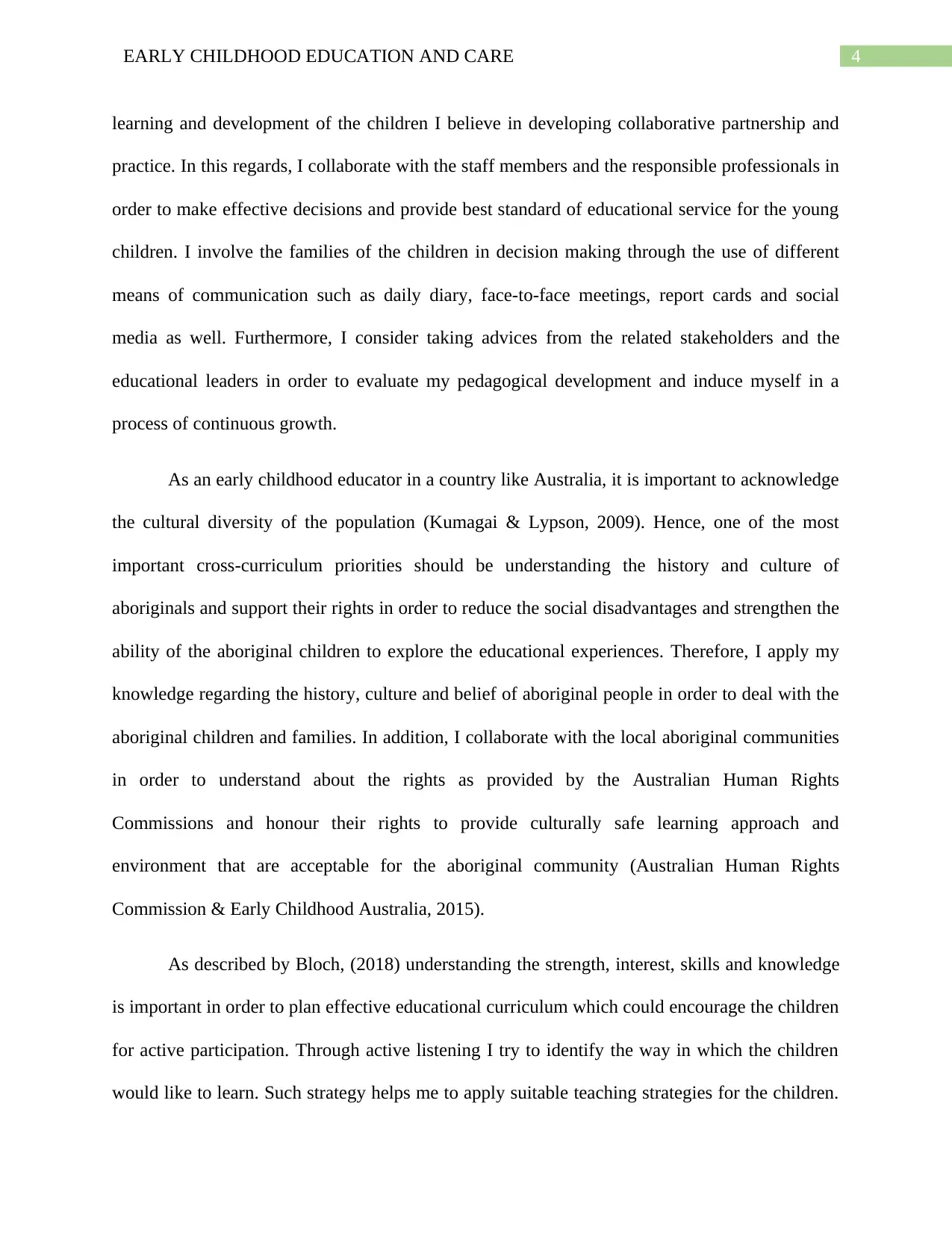
4EARLY CHILDHOOD EDUCATION AND CARE
learning and development of the children I believe in developing collaborative partnership and
practice. In this regards, I collaborate with the staff members and the responsible professionals in
order to make effective decisions and provide best standard of educational service for the young
children. I involve the families of the children in decision making through the use of different
means of communication such as daily diary, face-to-face meetings, report cards and social
media as well. Furthermore, I consider taking advices from the related stakeholders and the
educational leaders in order to evaluate my pedagogical development and induce myself in a
process of continuous growth.
As an early childhood educator in a country like Australia, it is important to acknowledge
the cultural diversity of the population (Kumagai & Lypson, 2009). Hence, one of the most
important cross-curriculum priorities should be understanding the history and culture of
aboriginals and support their rights in order to reduce the social disadvantages and strengthen the
ability of the aboriginal children to explore the educational experiences. Therefore, I apply my
knowledge regarding the history, culture and belief of aboriginal people in order to deal with the
aboriginal children and families. In addition, I collaborate with the local aboriginal communities
in order to understand about the rights as provided by the Australian Human Rights
Commissions and honour their rights to provide culturally safe learning approach and
environment that are acceptable for the aboriginal community (Australian Human Rights
Commission & Early Childhood Australia, 2015).
As described by Bloch, (2018) understanding the strength, interest, skills and knowledge
is important in order to plan effective educational curriculum which could encourage the children
for active participation. Through active listening I try to identify the way in which the children
would like to learn. Such strategy helps me to apply suitable teaching strategies for the children.
learning and development of the children I believe in developing collaborative partnership and
practice. In this regards, I collaborate with the staff members and the responsible professionals in
order to make effective decisions and provide best standard of educational service for the young
children. I involve the families of the children in decision making through the use of different
means of communication such as daily diary, face-to-face meetings, report cards and social
media as well. Furthermore, I consider taking advices from the related stakeholders and the
educational leaders in order to evaluate my pedagogical development and induce myself in a
process of continuous growth.
As an early childhood educator in a country like Australia, it is important to acknowledge
the cultural diversity of the population (Kumagai & Lypson, 2009). Hence, one of the most
important cross-curriculum priorities should be understanding the history and culture of
aboriginals and support their rights in order to reduce the social disadvantages and strengthen the
ability of the aboriginal children to explore the educational experiences. Therefore, I apply my
knowledge regarding the history, culture and belief of aboriginal people in order to deal with the
aboriginal children and families. In addition, I collaborate with the local aboriginal communities
in order to understand about the rights as provided by the Australian Human Rights
Commissions and honour their rights to provide culturally safe learning approach and
environment that are acceptable for the aboriginal community (Australian Human Rights
Commission & Early Childhood Australia, 2015).
As described by Bloch, (2018) understanding the strength, interest, skills and knowledge
is important in order to plan effective educational curriculum which could encourage the children
for active participation. Through active listening I try to identify the way in which the children
would like to learn. Such strategy helps me to apply suitable teaching strategies for the children.
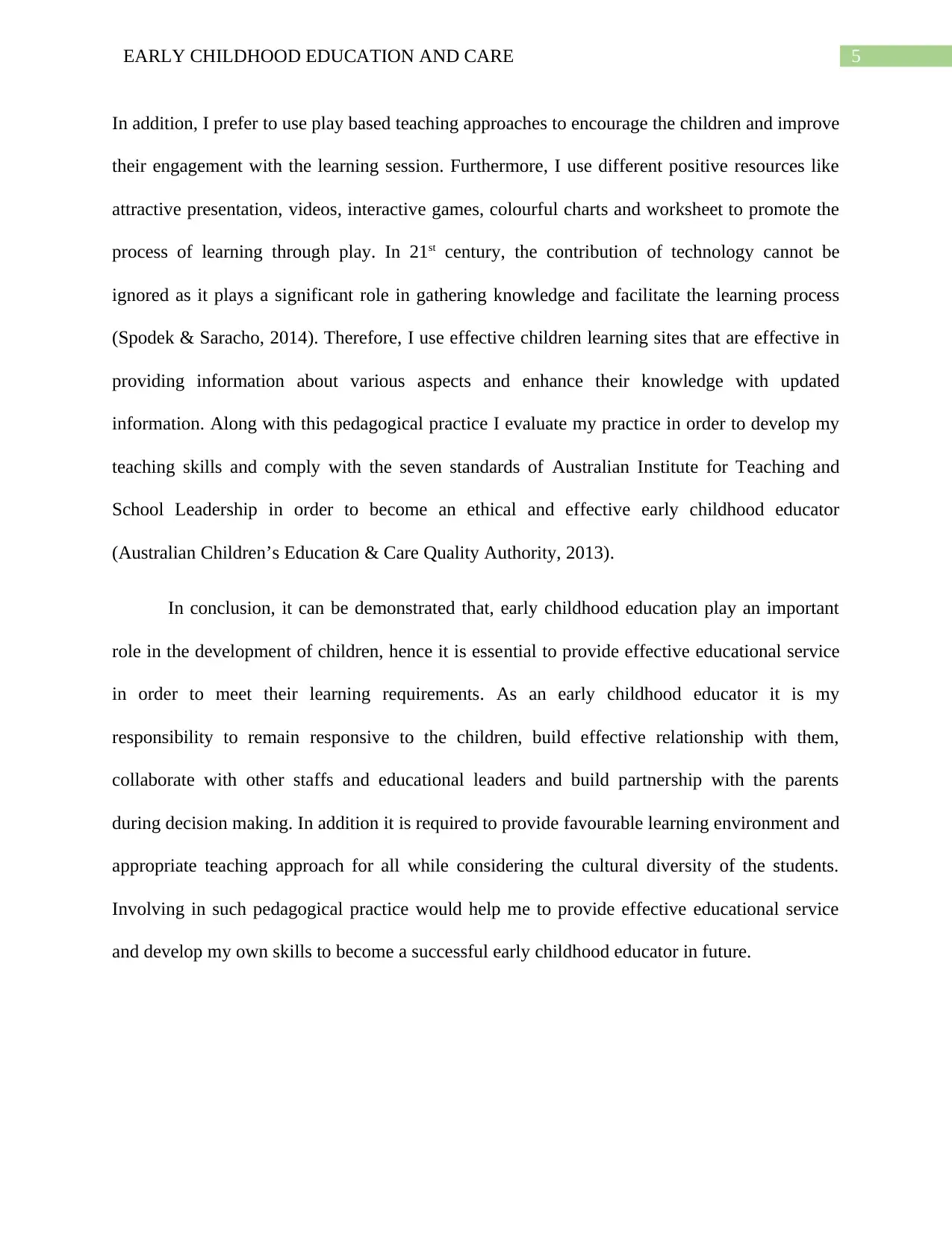
5EARLY CHILDHOOD EDUCATION AND CARE
In addition, I prefer to use play based teaching approaches to encourage the children and improve
their engagement with the learning session. Furthermore, I use different positive resources like
attractive presentation, videos, interactive games, colourful charts and worksheet to promote the
process of learning through play. In 21st century, the contribution of technology cannot be
ignored as it plays a significant role in gathering knowledge and facilitate the learning process
(Spodek & Saracho, 2014). Therefore, I use effective children learning sites that are effective in
providing information about various aspects and enhance their knowledge with updated
information. Along with this pedagogical practice I evaluate my practice in order to develop my
teaching skills and comply with the seven standards of Australian Institute for Teaching and
School Leadership in order to become an ethical and effective early childhood educator
(Australian Children’s Education & Care Quality Authority, 2013).
In conclusion, it can be demonstrated that, early childhood education play an important
role in the development of children, hence it is essential to provide effective educational service
in order to meet their learning requirements. As an early childhood educator it is my
responsibility to remain responsive to the children, build effective relationship with them,
collaborate with other staffs and educational leaders and build partnership with the parents
during decision making. In addition it is required to provide favourable learning environment and
appropriate teaching approach for all while considering the cultural diversity of the students.
Involving in such pedagogical practice would help me to provide effective educational service
and develop my own skills to become a successful early childhood educator in future.
In addition, I prefer to use play based teaching approaches to encourage the children and improve
their engagement with the learning session. Furthermore, I use different positive resources like
attractive presentation, videos, interactive games, colourful charts and worksheet to promote the
process of learning through play. In 21st century, the contribution of technology cannot be
ignored as it plays a significant role in gathering knowledge and facilitate the learning process
(Spodek & Saracho, 2014). Therefore, I use effective children learning sites that are effective in
providing information about various aspects and enhance their knowledge with updated
information. Along with this pedagogical practice I evaluate my practice in order to develop my
teaching skills and comply with the seven standards of Australian Institute for Teaching and
School Leadership in order to become an ethical and effective early childhood educator
(Australian Children’s Education & Care Quality Authority, 2013).
In conclusion, it can be demonstrated that, early childhood education play an important
role in the development of children, hence it is essential to provide effective educational service
in order to meet their learning requirements. As an early childhood educator it is my
responsibility to remain responsive to the children, build effective relationship with them,
collaborate with other staffs and educational leaders and build partnership with the parents
during decision making. In addition it is required to provide favourable learning environment and
appropriate teaching approach for all while considering the cultural diversity of the students.
Involving in such pedagogical practice would help me to provide effective educational service
and develop my own skills to become a successful early childhood educator in future.
⊘ This is a preview!⊘
Do you want full access?
Subscribe today to unlock all pages.

Trusted by 1+ million students worldwide
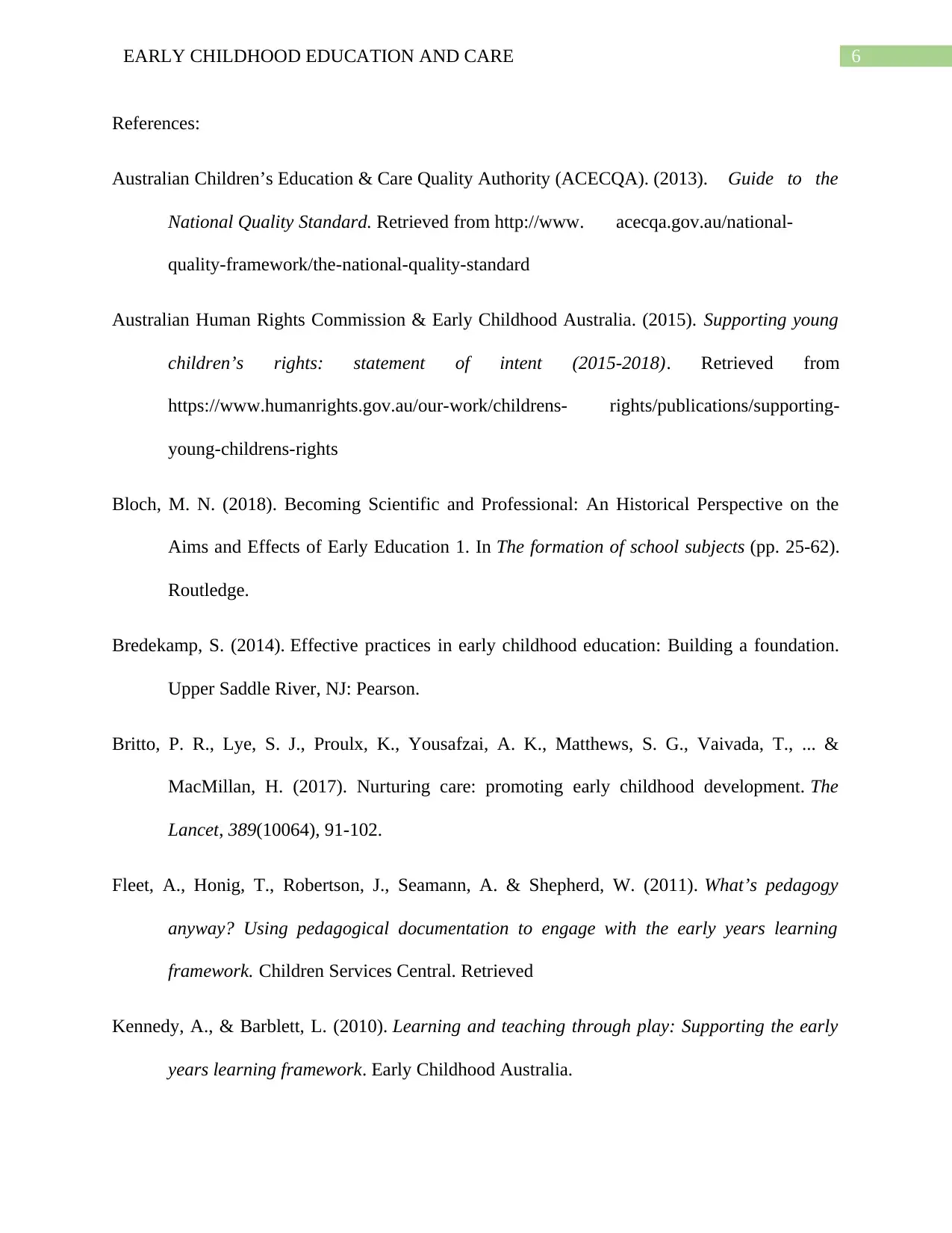
6EARLY CHILDHOOD EDUCATION AND CARE
References:
Australian Children’s Education & Care Quality Authority (ACECQA). (2013). Guide to the
National Quality Standard. Retrieved from http://www. acecqa.gov.au/national-
quality-framework/the-national-quality-standard
Australian Human Rights Commission & Early Childhood Australia. (2015). Supporting young
children’s rights: statement of intent (2015-2018). Retrieved from
https://www.humanrights.gov.au/our-work/childrens- rights/publications/supporting-
young-childrens-rights
Bloch, M. N. (2018). Becoming Scientific and Professional: An Historical Perspective on the
Aims and Effects of Early Education 1. In The formation of school subjects (pp. 25-62).
Routledge.
Bredekamp, S. (2014). Effective practices in early childhood education: Building a foundation.
Upper Saddle River, NJ: Pearson.
Britto, P. R., Lye, S. J., Proulx, K., Yousafzai, A. K., Matthews, S. G., Vaivada, T., ... &
MacMillan, H. (2017). Nurturing care: promoting early childhood development. The
Lancet, 389(10064), 91-102.
Fleet, A., Honig, T., Robertson, J., Seamann, A. & Shepherd, W. (2011). What’s pedagogy
anyway? Using pedagogical documentation to engage with the early years learning
framework. Children Services Central. Retrieved
Kennedy, A., & Barblett, L. (2010). Learning and teaching through play: Supporting the early
years learning framework. Early Childhood Australia.
References:
Australian Children’s Education & Care Quality Authority (ACECQA). (2013). Guide to the
National Quality Standard. Retrieved from http://www. acecqa.gov.au/national-
quality-framework/the-national-quality-standard
Australian Human Rights Commission & Early Childhood Australia. (2015). Supporting young
children’s rights: statement of intent (2015-2018). Retrieved from
https://www.humanrights.gov.au/our-work/childrens- rights/publications/supporting-
young-childrens-rights
Bloch, M. N. (2018). Becoming Scientific and Professional: An Historical Perspective on the
Aims and Effects of Early Education 1. In The formation of school subjects (pp. 25-62).
Routledge.
Bredekamp, S. (2014). Effective practices in early childhood education: Building a foundation.
Upper Saddle River, NJ: Pearson.
Britto, P. R., Lye, S. J., Proulx, K., Yousafzai, A. K., Matthews, S. G., Vaivada, T., ... &
MacMillan, H. (2017). Nurturing care: promoting early childhood development. The
Lancet, 389(10064), 91-102.
Fleet, A., Honig, T., Robertson, J., Seamann, A. & Shepherd, W. (2011). What’s pedagogy
anyway? Using pedagogical documentation to engage with the early years learning
framework. Children Services Central. Retrieved
Kennedy, A., & Barblett, L. (2010). Learning and teaching through play: Supporting the early
years learning framework. Early Childhood Australia.
Paraphrase This Document
Need a fresh take? Get an instant paraphrase of this document with our AI Paraphraser
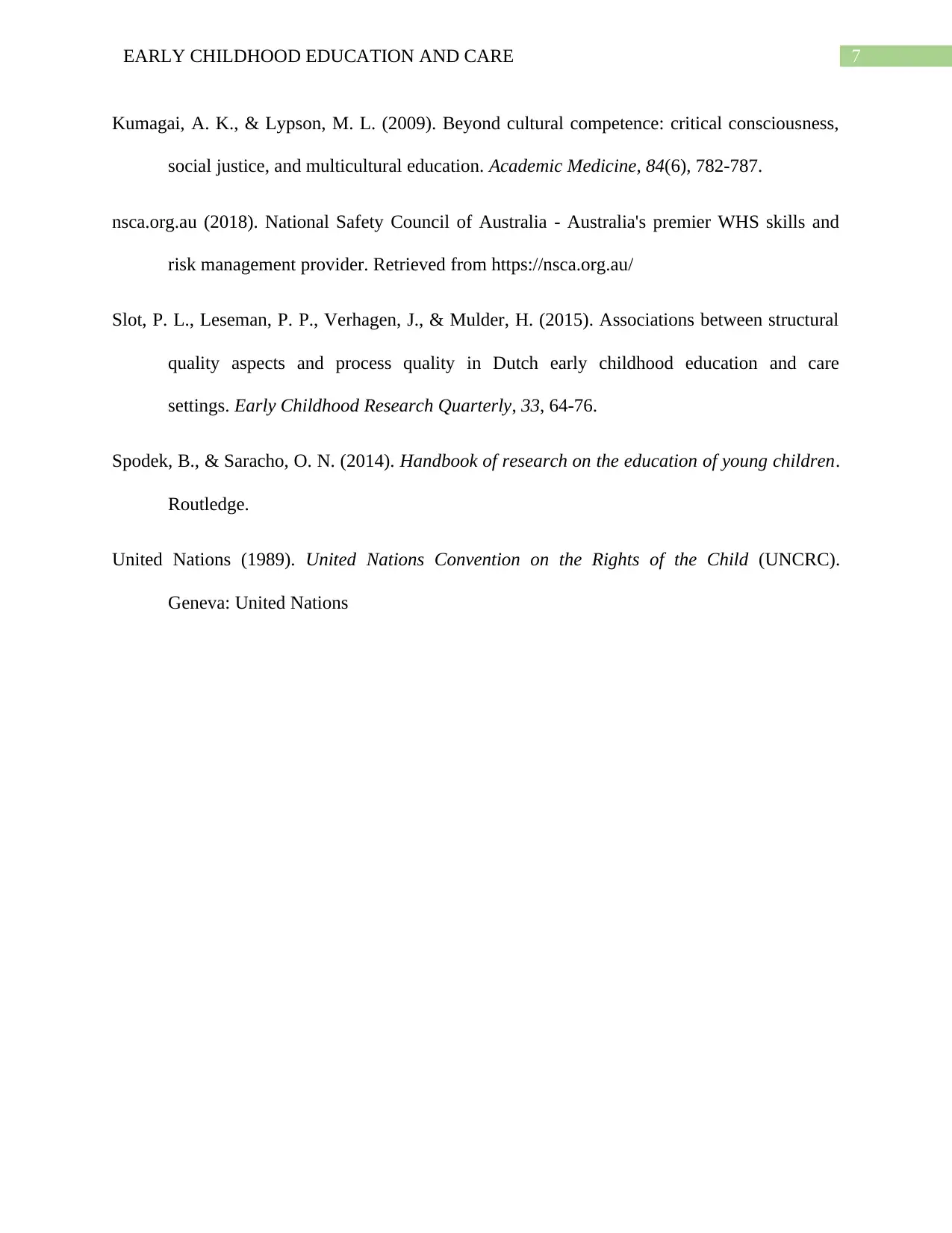
7EARLY CHILDHOOD EDUCATION AND CARE
Kumagai, A. K., & Lypson, M. L. (2009). Beyond cultural competence: critical consciousness,
social justice, and multicultural education. Academic Medicine, 84(6), 782-787.
nsca.org.au (2018). National Safety Council of Australia - Australia's premier WHS skills and
risk management provider. Retrieved from https://nsca.org.au/
Slot, P. L., Leseman, P. P., Verhagen, J., & Mulder, H. (2015). Associations between structural
quality aspects and process quality in Dutch early childhood education and care
settings. Early Childhood Research Quarterly, 33, 64-76.
Spodek, B., & Saracho, O. N. (2014). Handbook of research on the education of young children.
Routledge.
United Nations (1989). United Nations Convention on the Rights of the Child (UNCRC).
Geneva: United Nations
Kumagai, A. K., & Lypson, M. L. (2009). Beyond cultural competence: critical consciousness,
social justice, and multicultural education. Academic Medicine, 84(6), 782-787.
nsca.org.au (2018). National Safety Council of Australia - Australia's premier WHS skills and
risk management provider. Retrieved from https://nsca.org.au/
Slot, P. L., Leseman, P. P., Verhagen, J., & Mulder, H. (2015). Associations between structural
quality aspects and process quality in Dutch early childhood education and care
settings. Early Childhood Research Quarterly, 33, 64-76.
Spodek, B., & Saracho, O. N. (2014). Handbook of research on the education of young children.
Routledge.
United Nations (1989). United Nations Convention on the Rights of the Child (UNCRC).
Geneva: United Nations
1 out of 8
Related Documents
Your All-in-One AI-Powered Toolkit for Academic Success.
+13062052269
info@desklib.com
Available 24*7 on WhatsApp / Email
![[object Object]](/_next/static/media/star-bottom.7253800d.svg)
Unlock your academic potential
Copyright © 2020–2026 A2Z Services. All Rights Reserved. Developed and managed by ZUCOL.





